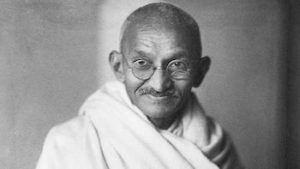
Mohandas Gandhi
*Mohandas Gandhi was born on this date in 1869. He was an Indian lawyer, anti-colonial nationalist, and political ethicist.
Mohandas Karamchand Gandhi was born and raised in a Hindu family in coastal Gujarat, western India. He was trained in law at the Inner Temple, London, and called to the bar at age 22 in 1891. After two years in India, where he could not start a successful law practice, he moved to South Africa in 1893 to represent an Indian merchant in a lawsuit. He went on to stay for 21 years.
When Gandhi arrived in South Africa, he thought of himself as "a Briton first, and an Indian second." Gandhi faced discrimination because of his skin color and heritage, like all people of color. He was not allowed to sit with white passengers in the stagecoach and was told to sit on the floor near the driver, then beaten when he refused. He found the prejudice against Indians from white people humiliating. He struggled to understand how some people can feel superiority or pleasure in such inhumane practices. Gandhi was not interested in politics until he was thrown out of a train coach by a white train official because of his skin color.
He entered politics by forming the Natal Indian Congress. Gandhi, at age 24, prepared a legal brief for the Natal Assembly in 1895, seeking voting rights for Indians. Gandhi cited race history and argued that Indians should not be grouped with Africans. According to Ashwin Desai and Goolam Vahed, Gandhi's views on racism are contentious and sometimes painful. During a speech in September 1896, Gandhi complained that the whites in the British colony of South Africa were degrading Indian Hindus and Muslims to "a level of Kaffir". Scholars cite it as evidence that Gandhi, at that time, thought of Indians as African Americans and Black South Africans differently.
According to Nelson Mandela, Gandhi and his colleagues served and helped Black Africans as nurses by opposing racism. In South Africa, Gandhi raised a family and first employed nonviolent resistance in a campaign for civil rights. The public image of Gandhi has been reinvented since his assassination as if he was always a saint when his life was more complex, contained inconvenient truths, and was one that evolved. In contrast, other African scholars state the evidence points to a rich history of cooperation and efforts by Indian people with nonwhite South Africans against the persecution of Africans and the Apartheid after his murder. When the British declared war against the Zulu Kingdom in Natal, Gandhi sympathized with the Zulu community and encouraged the Indian volunteers to help as an ambulance unit. He argued that Indians should participate in the war efforts to change attitudes and perceptions of the British people against people of color.
Gandhi, a group of 20 Indians and African people of South Africa, volunteered as a stretcher-bearer corps to treat wounded British soldiers and the Zulu victims. Whites stopped Gandhi and the team from treating the injured Zulu, and the British killed some African stretcher-bearers. The medical team commanded by Gandhi operated for less than two months. Gandhi volunteering to help as a "staunch loyalist" during the Zulu and other wars made no difference in the British attitude. The African experience was a part of his great disillusionment with the West, transforming him into an "uncompromising non-cooperator." 1910, Gandhi and Hermann Kallenbach established "Tolstoy Farm," an idealistic community near Johannesburg. There, he nurtured his policy of peaceful resistance.
In 1915, aged 45, he returned to India. He organized peasants, farmers, and urban laborers to protest against land tax and discrimination. Assuming leadership of the Indian National Congress in 1921, Gandhi led nationwide campaigns for easing poverty and expanding women's rights. He built religious and ethnic amity, ending untouchability and achieving Swaraj or self-rule. Gandhi employed nonviolent resistance to lead the successful campaign for India's independence from British Rule and inspired worldwide civil rights and freedom movements.
He inspired many Black nonviolent leaders of the 20th-century American Civil Rights movement. Howard Thurman met with Gandhi in 1935, Benjamin Mays in 1936, and William Stuart Nelson in 1946. Bayard Rustin, James Lawson, and Mordecai Johnson had also visited India.
Gandhi was shot and killed by the Hindu fanatic Nathuram Godse on January 30, 1948. South African apartheid became law two years later. Martin Luther King Jr. first employed nonviolent direct action strategies in the 1955 to 1956 Montgomery bus boycott. After Black South Africans gained the right to vote in South Africa (1994), Gandhi was proclaimed a national hero with numerous monuments.